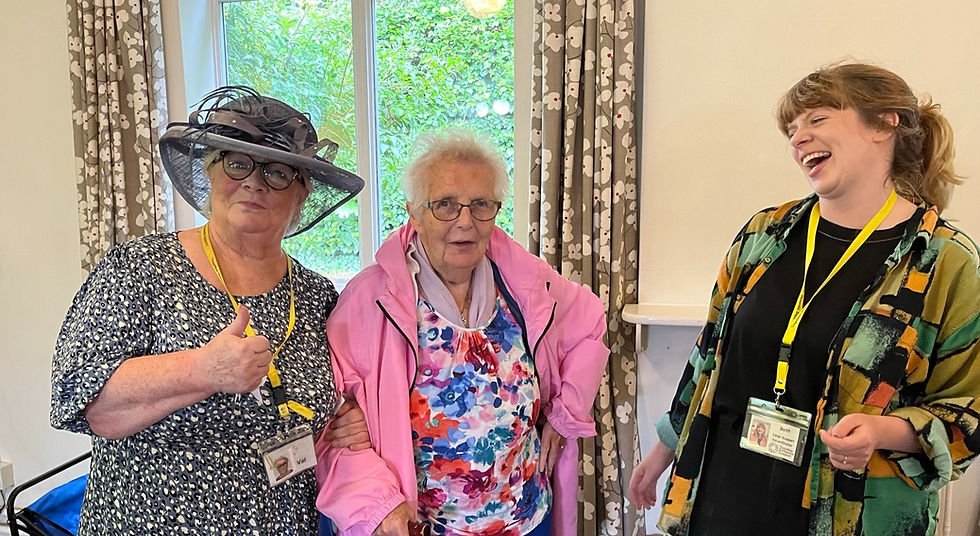Tackling Loneliness in People With Dementia This Winter
- sally8553
- Oct 30, 2023
- 4 min read
by Hannah Walters
As we start to edge towards the colder months of the year, loneliness can become a big issue, especially for those living with dementia. This shorter days and limited social interaction due to the colder temperatures can increase this. In turn, this can begin to develop into feelings of isolation and depression.
At Together Dementia Support, our aim is to offer valuable resources and education, not only to those living with dementia but also their loved ones, friends and caregivers. That's why we've created some pratical and useful steps that can be taken to fight off loneliness this winter.

The connection between loneliness and dementia
Loneliness and dementia are very closely linked. In fact, 38% of people with dementia said that they feel isolated. This can be down to many reasons, from the lack of social interactions to a change in living situations. Furthermore, a lack of socialising can lead to a decline in cognitive abilities which could increase symptoms of dementia.
It’s paramount to provide those living with dementia with emotional support. Try following some of the following steps to help increase meaningful connections.
Engage in meaningful activities

Participating in activities is a fantastic way to provide stimulation and purpose. It’s not only going to improve a person’s cognitive functions in turn, it’ll also boost their mood. These activities can range from exercise classes to something more creative like painting.
Have a look into group activities, attending something like this will enable individuals to connect with like-minded people and gain a sense of community. Anything that’s engaging as well as enjoyable will provide valuable stimulation both mentally and physically.
Embrace technology

We’re lucky to live in such an advanced world. There are even specific tools that are designed with dementia in mind, such as digital companions and memory aids that remind a person of important events and dates.
There’s also the option to connect with loved ones from anywhere by using video calling platforms like Skype and Zoom which are free to use.
Technology can improve the quality of life of those living with dementia and be uplifting. There’s so many options available these days to be in touch with people without them physically being there.
Note: not everyone will be tech-savvy. Any technology used should be tailored to the person's needs and abilities. This will ensure it’s both accessible and enjoyable for the individual.
Encourage social interaction

Encouraging social interaction can benefit dementia patients during the winter. According to Alzheimer’s UK, during lockdown, 82% of those affected by dementia experienced a cognitive decline.
Caregivers should schedule regular outings. Have a look at free indoor museums and creative workshops, these both offer fun and mentally stimulating ways to connect with others.
Note: even the smallest of interactions can improve how a person feels.
Plan outdoor activities (even when it’s cold)

Going outdoors and getting some fresh air might be the last thing anyone wants to do in winter.
But, by incorporating regular outdoor activities into a dementia patient’s daily routine, they’ll be together with nature and getting some regular exercise. Avoid the bad weather, but getting outdoors can be a great mood booster.
Just going for a walk and talking to people along the way can brighten someone’s mood.
Note: if the person with dementia is unable to leave the house, then sit them next to a window. Being close to the outside world and natural light is a great mood booster.
Provide sensory stimulation

When getting outside becomes more of a challenge, engaging the senses can work wonders to lift spirits. Simple activities can spark joyful memories in those living with dementia and combat feelings of isolation. A great example is playing a favourite song to bring a wave of happiness. Even if the exact memory linked to the music isn’t clear, the familiar melody can still provide a sense of warmth and comfort.
Baking and cooking are multi-sensory activities that can help those living with dementia to rekindle memories. In turn, this improves their relationship with their caregiver.
Sensory stimulation can act as a bridge between the internal and external world of dementia patients and help them feel less disconnected during the winter.
Carer advice – How to spot if your loved one is feeling lonely this winter
Caregivers must be able to spot signs of loneliness in your cared-for person as it can affect their mental health. But how do we know what we’re looking for? Especially if they hide it so well.
Look out for changes in their behaviours such as low appetite and changes in sleeping patterns. It can be common for them to withdraw from social activities and spend more time alone.
If you’re concerned, have a chat and see if you can get to the bottom of how they’re feeling. Provide plenty of opportunities to be socially active and spot any signs early to prevent winter loneliness from setting in throughout the season.

Seek professional support
We completely understand that reaching out to a professional for help can be a little overwhelming at first. Even so, when trying to learn how to manage feelings of loneliness and depression, it can make all the difference.
It might seem scary but it’s a start towards feeling better.
At Together Dementia Support we provide excellent options for those seeking a helping hand. We offer a range of services to help people with dementia and their caregivers. These include social events, support groups and personalised advice.
Reaching out for help will do more than give you practical advice or solutions. It’s like finding a place in a community and reminding you – you’re not alone in this.




Comments